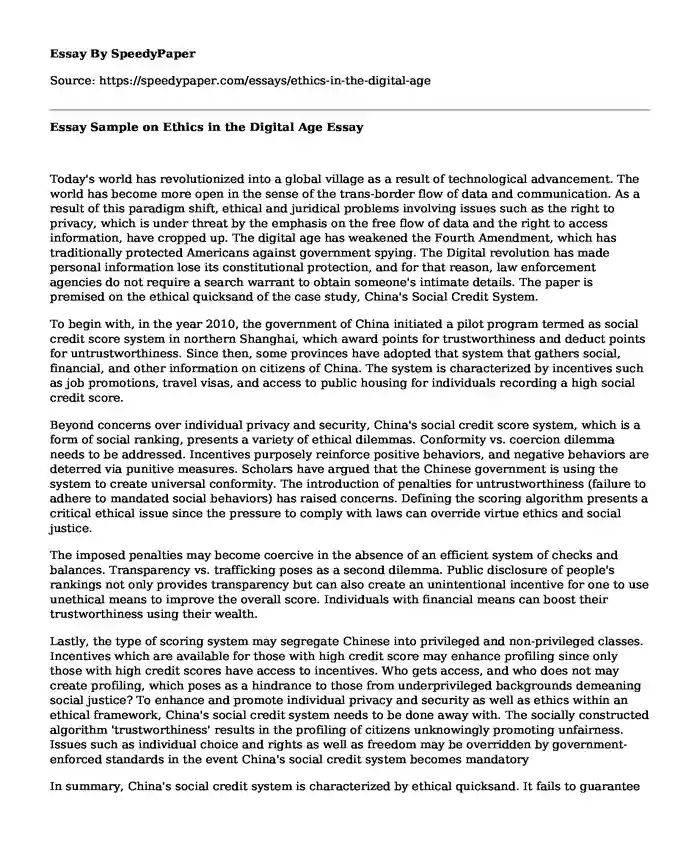
| Essay type: | Argumentative essays |
| Categories: | Data analysis Ethics International business |
| Pages: | 3 |
| Wordcount: | 584 words |
Today's world has revolutionized into a global village as a result of technological advancement. The world has become more open in the sense of the trans-border flow of data and communication. As a result of this paradigm shift, ethical and juridical problems involving issues such as the right to privacy, which is under threat by the emphasis on the free flow of data and the right to access information, have cropped up. The digital age has weakened the Fourth Amendment, which has traditionally protected Americans against government spying. The Digital revolution has made personal information lose its constitutional protection, and for that reason, law enforcement agencies do not require a search warrant to obtain someone's intimate details. The paper is premised on the ethical quicksand of the case study, China's Social Credit System.
To begin with, in the year 2010, the government of China initiated a pilot program termed as social credit score system in northern Shanghai, which award points for trustworthiness and deduct points for untrustworthiness. Since then, some provinces have adopted that system that gathers social, financial, and other information on citizens of China. The system is characterized by incentives such as job promotions, travel visas, and access to public housing for individuals recording a high social credit score.
Beyond concerns over individual privacy and security, China's social credit score system, which is a form of social ranking, presents a variety of ethical dilemmas. Conformity vs. coercion dilemma needs to be addressed. Incentives purposely reinforce positive behaviors, and negative behaviors are deterred via punitive measures. Scholars have argued that the Chinese government is using the system to create universal conformity. The introduction of penalties for untrustworthiness (failure to adhere to mandated social behaviors) has raised concerns. Defining the scoring algorithm presents a critical ethical issue since the pressure to comply with laws can override virtue ethics and social justice.
The imposed penalties may become coercive in the absence of an efficient system of checks and balances. Transparency vs. trafficking poses as a second dilemma. Public disclosure of people's rankings not only provides transparency but can also create an unintentional incentive for one to use unethical means to improve the overall score. Individuals with financial means can boost their trustworthiness using their wealth.
Lastly, the type of scoring system may segregate Chinese into privileged and non-privileged classes. Incentives which are available for those with high credit score may enhance profiling since only those with high credit scores have access to incentives. Who gets access, and who does not may create profiling, which poses as a hindrance to those from underprivileged backgrounds demeaning social justice? To enhance and promote individual privacy and security as well as ethics within an ethical framework, China's social credit system needs to be done away with. The socially constructed algorithm 'trustworthiness' results in the profiling of citizens unknowingly promoting unfairness. Issues such as individual choice and rights as well as freedom may be overridden by government-enforced standards in the event China's social credit system becomes mandatory
In summary, China's social credit system is characterized by ethical quicksand. It fails to guarantee individual choice, rights, and freedom. There is much good to be obtained from China's social credit system, but it is marked by negative sides such as data privacy, cybersecurity, and ethical debates over its fairness. It cannot represent a technological breakthrough unless the critical ethical issues are sorted out. Therefore, there is a need for debate to address the ethical issues associated with it before it becomes mandatory.
Cite this page
Essay Sample on Ethics in the Digital Age. (2023, Sep 28). Retrieved from https://speedypaper.com/essays/ethics-in-the-digital-age
Request Removal
If you are the original author of this essay and no longer wish to have it published on the SpeedyPaper website, please click below to request its removal:
- Free Essay on Civil-Military Relations
- Worksheet On Radiation Essay Example
- Industrialization of Multinational Enterprises, Essay Sample for Everyone
- From Cooperative to Coercive Federalism, Free Essay in Political Science
- Essay Sample: Environment Ethical Theories
- Essay Example on Service Encounters
- Free Essay Example. Why Animal Testing Should Be Banned
Popular categories




